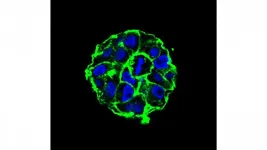(Press-News.org) TAMPA, Fla. -- Chimeric antigen receptor T-cell therapy, or CAR T, has been a breakthrough in the treatment of blood cancers such as acute lymphoblastic leukemia and diffuse large B-cell lymphoma. Clinical studies have shown overall response rates of more than 80% with an ongoing response of nearly 40% more than two years after therapy. However, the cellular immunotherapy doesn't work for every patient. Moffitt Cancer Center, one of the leading centers for cellular immunotherapy, is researching why some patients have a better CAR T response than others and what can be done to improve the treatment's effectiveness. In a new study published in Blood, the official journal of the American Society of Hematology, Moffitt researchers show that immune dysregulation can directly affect the efficacy of CAR T therapy in patients with diffuse large B-cell lymphoma.
Diffuse large B-cell lymphoma is the most common type of non-Hodgkin lymphoma. It is an aggressive cancer affecting B lymphocytes, a type of white blood cell that helps the body fight infection. Axicabtagene ciloleucel was the first CAR T therapy approved for the treatment of this type of cancer. It is indicated for patients with refractory or relapsed disease, meaning they have failed two or more prior courses of therapy. For CAR T-cell therapy, a patient's immune cells are collected through a process called apheresis. Those immune cells are genetically modified in a lab, adding a chimeric antigen receptor that helps the T cells locate and kill tumor cells once infused back into the patient.
For this observational study, the research team collected blood and tumor samples from 105 patients treated with axicabtagene ciloleucel. The samples, which were taken before and after therapy, were analyzed. Patients were categorized into two groups: durable responders, meaning they remained in remission at a minimum follow-up of six months following CAR T infusion, and nondurable responders who experienced relapsed lymphoma.
"Large B cell lymphoma patients with active disease already experience immune dysregulation, such as elevated cytokines, altered myeloid cell populations and T cell deficits. Our analysis was to determine how these immune characteristics and inflammation affect the ability for CAR T cells to expand and seek out cancer cells following infusion," said Frederick Locke, M.D., vice chair of the Blood and Marrow Transplant and Cellular Immunotherapy Department and co-leader of the Immuno-Oncology Program at Moffitt.
The results showed that large tumors lead to immune dysregulation in patients due to chronic interferon signaling within the tumor and high cytokine levels in the patient. Overall, CAR T-cell therapy was less likely to be successful in patients with immune dysregulation. This was attributed to impairment of the growth of CAR T cells in these patients, as well as resistance to CAR T-cell therapy by the tumor due to the expression of multiple immune checkpoints.
"These findings could help improve the way we administer CAR T therapy on two fronts. We can use interventions to help improve the quality of patients' immune cells prior to apheresis, resulting in a better CAR T product. We can also help better prepare patients' immune systems to receive the CAR T cells to increase response following infusion," said Michael Jain, M.D., Ph.D., assistant member of the Blood and Marrow Transplant and Cellular Immunotherapy Department at Moffitt.
The researchers stress more study is needed to determine what those interventions would be, but there is hope these findings can help modify therapy to reduce relapses that occur following CAR T therapy.
INFORMATION:
This study was supported by the National Institutes of Health (P30 CA076292, K23 CA201594), Pinellas Partners, the Hoenle family, The Hyer Family Foundation, and the John Morroni Pinellas County First Responders Ball.
About Moffitt Cancer Center
Moffitt is dedicated to one lifesaving mission: to contribute to the prevention and cure of cancer. The Tampa-based facility is one of only 51 National Cancer Institute-designated Comprehensive Cancer Centers, a distinction that recognizes Moffitt's scientific excellence, multidisciplinary research, and robust training and education. Moffitt is the No. 11 cancer hospital and has been nationally ranked by U.S. News & World Report since 1999. Moffitt's expert nursing staff is recognized by the American Nurses Credentialing Center with Magnet® status, its highest distinction. With more than 7,000 team members, Moffitt has an economic impact in the state of $2.4 billion. For more information, call 1-888-MOFFITT (1-888-663-3488), visit MOFFITT.org, and follow the momentum on Facebook, Twitter, Instagram and YouTube.
The many different sensations our bodies experience are accompanied by deeply complex exchanges of information within the brain, and the feeling of pain is no exception. So far, research has shown how pain intensity can be directly related to specific patterns of oscillation in brain activity, which are altered by the activation and deactivation of the 'interneurons' connecting different regions of the brain. However, it remains unclear how the process is affected by 'inhibitory' interneurons, which prevent chemical messages from passing between these regions. Through new research published in EPJ ...
Researchers developing renewable plastics and exploring new processes for plastics upcycling and recycling technologies will now be able to easily baseline their efforts to current manufacturing practices to understand if their efforts will save energy and reduce greenhouse gas emissions.
Benchmark data calculated and compiled at the National Renewable Energy Laboratory (NREL) provide a measurement--at the supply chain level--of how much energy is required and the amount of greenhouse gases emitted from the production of a variety of plastics in the United States.
"Today, we employ a predominantly linear economy for many of the materials we use, including plastics," said Gregg Beckham, a senior research fellow at NREL. "Many people ...
A soft, flexible sensor system created with electrically conductive yarns could help map problematic pressure points in the socket of an amputee's prosthetic limb, researchers from North Carolina State University report in a new study.
In IEEE Sensors Journal, researchers from North Carolina State University reported on the lightweight, soft textile-based sensor prototype patch. The device incorporates a lattice of conductive yarns and is connected to a tiny computer. They tested the system on a prosthetic limb and in walking experiments with two human volunteers, finding the system could ...
An international research team from the Photobiotechnology Research Group at Ruhr-Universität Bochum (RUB) led by Professor Thomas Happe and the Laboratoire de Bioénergétique et Ingénierie des Protéines (CNRS) in Marseille has been able to get to the bottom of this unique feature. They describe the molecular mechanism in Nature Communications on 2 February 2021.
Enzyme repeatedly survives the attack unharmed
Representatives of the [FeFe]-hydrogenase enzyme group combine protons and electrons to form molecular hydrogen at particularly high turnover rates. Some of them even use sunlight as a primary energy source ...
DANVILLE, Pa. and GAITHERSBURG, Md. - Researchers have discovered a strong link between genetic changes known to cause neurodevelopmental disabilities and cerebral palsy.
Cerebral palsy affects movement and posture and often co-occurs with other neurodevelopmental disorders, including intellectual disability, epilepsy and autism spectrum disorder. Individual cases of cerebral palsy are often attributed to birth asphyxia, although recent studies indicate that asphyxia accounts for less than 10% of cases. A growing body of research indicates that cerebral palsy may be caused by genetic changes, ...
BOSTON -- Genome-wide association studies (GWAS) have typically excluded diverse and minority individuals in the search for gene variants that confer risk of disease. Researchers at Massachusetts General Hospital (MGH), the Broad Institute of MIT and Harvard, and other institutions around the world have now developed a free-access software package called Tractor that increases the discovery power of genomics in understudied populations. A study of Tractor's performance and accuracy was published in END ...
New research has found that men who have the Western world's most common genetic disorder are more likely to develop dementia, compared to those without the faulty genes.
Researchers at the University of Exeter and the University of Connecticut have previously found that men with two faulty genes that cause the iron overload condition haemochromatosis are more likely to develop liver cancer, arthritis and frailty, compared to those without the faulty genes.
Now, the team's new analysis of more than 335,000 people of European ancestry in UK Biobank, ...
WASHINGTON, February 2, 2021 -- Scientists are hoping advances in cancer research could lead to a day when a patient's own immune system could be used to fight and destroy a wide range of tumors.
Cancer immunotherapy has some remarkable successes, but its effectiveness has been limited to a relatively small handful of cancers. In APL Bioengineering, by AIP Publishing, a team from Stanford University and Genentech describes how advances in engineering models of tumors can greatly expand cancer immunotherapy's effectiveness to a wider range of cancers.
"One of the biggest breakthroughs we've had in cancer research in decades is that we can modify the cells in your own immune system to make them kill cancer cells," said author Joanna Lee.
Using ...
GRAND RAPIDS, Mich. (Feb. 2, 2021) -- What does bile acid production in the digestive tract have to do with Parkinson's disease?
Quite a lot, according to a sweeping new analysis published in the journal Metabolites. The findings reveal that changes in the gut microbiome -- the rich population of helpful microbes that call the digestive tract home -- may in turn alter bile acid production by favoring synthesis of toxic forms of the acids.
These shifts were seen only in people with Parkinson's and not in healthy controls, a critical difference that suggests bile acids may be a viable biomarker for diagnosing Parkinson's early and tracking its progression. The insights also may provide new avenues for developing therapies ...
Colorectal cancer is the second most common cause of cancer-related mortality among men and women in the United States, according to the American Cancer Society. At-home tests, which measure blood in stool as a potential marker for colon cancer, are often used for colorectal cancer screening.
Usage of these tests has increased during the COVID-19 pandemic as people try to avoid clinical visits. However, effectiveness of these screening tools, along with all colon cancer screenings, requires a follow-up colonoscopy if an abnormal test result occurs. The problem is ...

